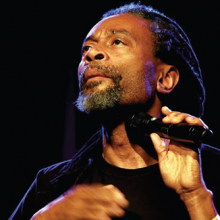depth
“WE ARE AT the moment when our lives must be placed on the line if our nation is to survive its own folly.”
Martin Luther King Jr. gave this stinging critique of the apathetic nature of both the U.S. church and the general public more than 40 years ago. While some things have changed for the better, the truth remains that the three evils of society that King named (racism, militarism, materialism) continue to pervade U.S. culture, crippling our moral and ethical foundation.
It is difficult to imagine that someone the FBI once labeled as “the most dangerous man in America” would one day have his own national holiday. Each year we celebrate the life of King with an incomplete and romanticized retelling of the impact he had on society during and after the civil rights movement. He dreamed of a better nation, but what was it about his dream that made him a nightmare to the U.S. government?
IN THE PAST 150 years, the songs historically known as “Negro spirituals” have worn many costumes. They emerged, of course, from the Deep South during the days of slavery, when songs such as “Every Time I Feel the Spirit” or “Wade in the Water” were first sung by anonymous psalmists wielding hoes or pulling cotton sacks. Since that time they’ve been dressed in the style of the European art song, sung as grand opera, or even faithfully mimicked by well-meaning white folk singers.
The spirituals entered the mainstream of American culture through the performances of the Fisk Jubilee Singers from Fisk University in Nashville who, fresh out of slavery themselves, toured the North in the 1870s. In the 1950s and ’60s, the old standards were resurrected, and slightly rewritten, as marching songs for the African-American freedom movement and then echoed across the world as anthems for human rights from South Africa to Northern Ireland to Eastern Europe.
After all that, the spirituals can probably even survive being remade into “smooth jazz,” which is more or less what happens to them on Bobby McFerrin’s new album Spirityouall. Readers of a certain age might remember McFerrin as the guy who, in 1988, conquered the known pop music universe with an airheaded ditty called “Don’t Worry, Be Happy.” The tune was so infectious that it should have had a warning label from the Centers for Disease Control, but instead it dominated radio, won some Grammys, and, to McFerrin’s eternal horror, was used as theme music by the George H.W. Bush presidential campaign.
THERE IS STILL a political definition of “Christian” out there that is depressingly familiar: the right-wing voting, Fox News-sourced agitprop spewer who uses Jesus to shoehorn others into something the actual Lord of the universe could care less about. Lillian Daniel is not going to take this definition anymore, but she’s not mad as hell. She’s winsome as heaven. Her humor clears the way for her preaching to hit home, and her love for the church, both her congregation and universal, anchors this work. Give it out to your friends and to strangers on the street.
First, Daniel’s humor: It is hard to give examples of her humor without them falling flat. She’s at her droll best when the reader’s defenses aren’t up. This isn’t the humor of the warm-up act before the preacher gets on to something serious—she often drives her meatiest points home with her funniest stuff. For example, a running motif in the book is the airplane companion who thinks he’s being edgy when he says to the pastor beside him that he sees God in rainbows and sunsets. This “spiritual but not religious” mindset is now the bland norm in America, not some spectacular new revelation: “They are far too busy being original to discover that they are not.”
Some of Daniel’s most withering observations are reserved for the mainline church she loves: the sneering religious critic is told “all those questions actually make him a very good mainline Protestant.” The self-congratulatory short-term missionary who comes home convinced how “lucky” she is to live in America receives this barb: “When generosity begets stupidity it wasn’t really generosity to begin with.”
"EVEN IF I OWNED Picasso's 'Guernica,' I could not hang it on a wall in my house, and although I own a recording of the Solti Chicago Symphony performance of Stravinsky's 'Rite of Spring,' I play it only rarely. One cannot live every day on the boundary of human existence in the world, and yet it is to this boundary that one is constantly brought by the parables of Jesus." So wrote a great New Testament scholar, Norman Perrin, in his book Jesus and the Language of the Kingdom. I often think about his frankness as I prepare for the transition between Epiphany and Lent. We must soften and make bearable the intensity of the scriptural story to face it every week in church. We can't dive to the depths every single week, and we are right to keep our child-friendliness going.
But we need to risk depth and passion, or run the danger of making the gospel seem boring and predictable. Our churchly betrayal of God lies in our willingness to make the Word seem banal. So perhaps the thing we need to give up for Lent is our avoidance of depth. The scriptures this month will speak to us of faith as the experience of being stressed almost to a breaking point. They will plumb the depths of divine frustration and disappointment. We must clear a space for these wounding and thrilling themes and suspend our strategies for making worship palatable and safe.


